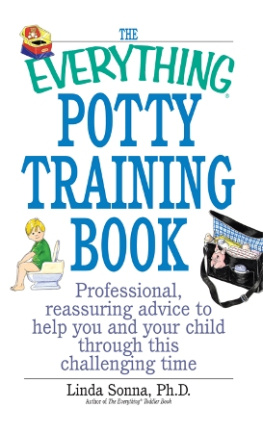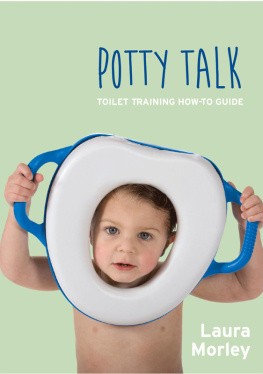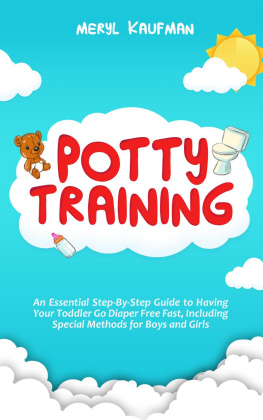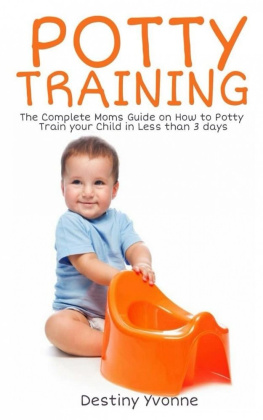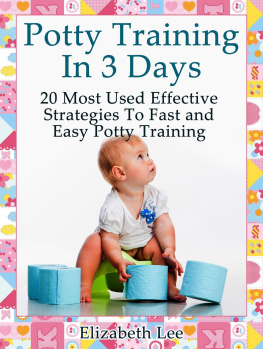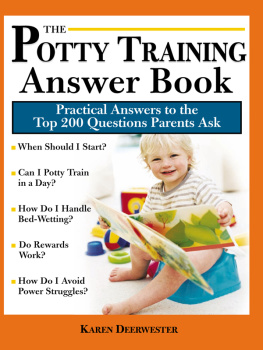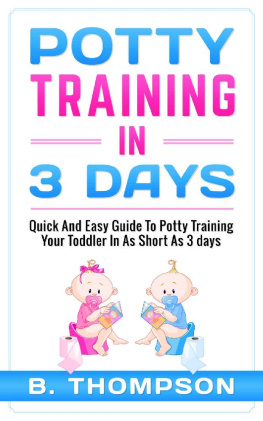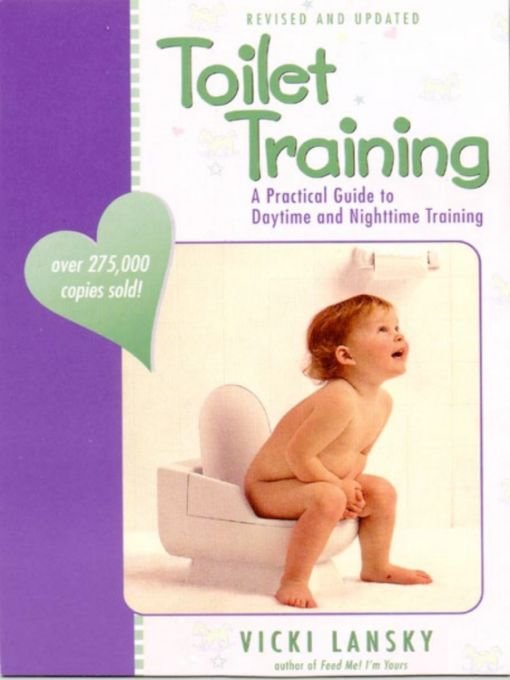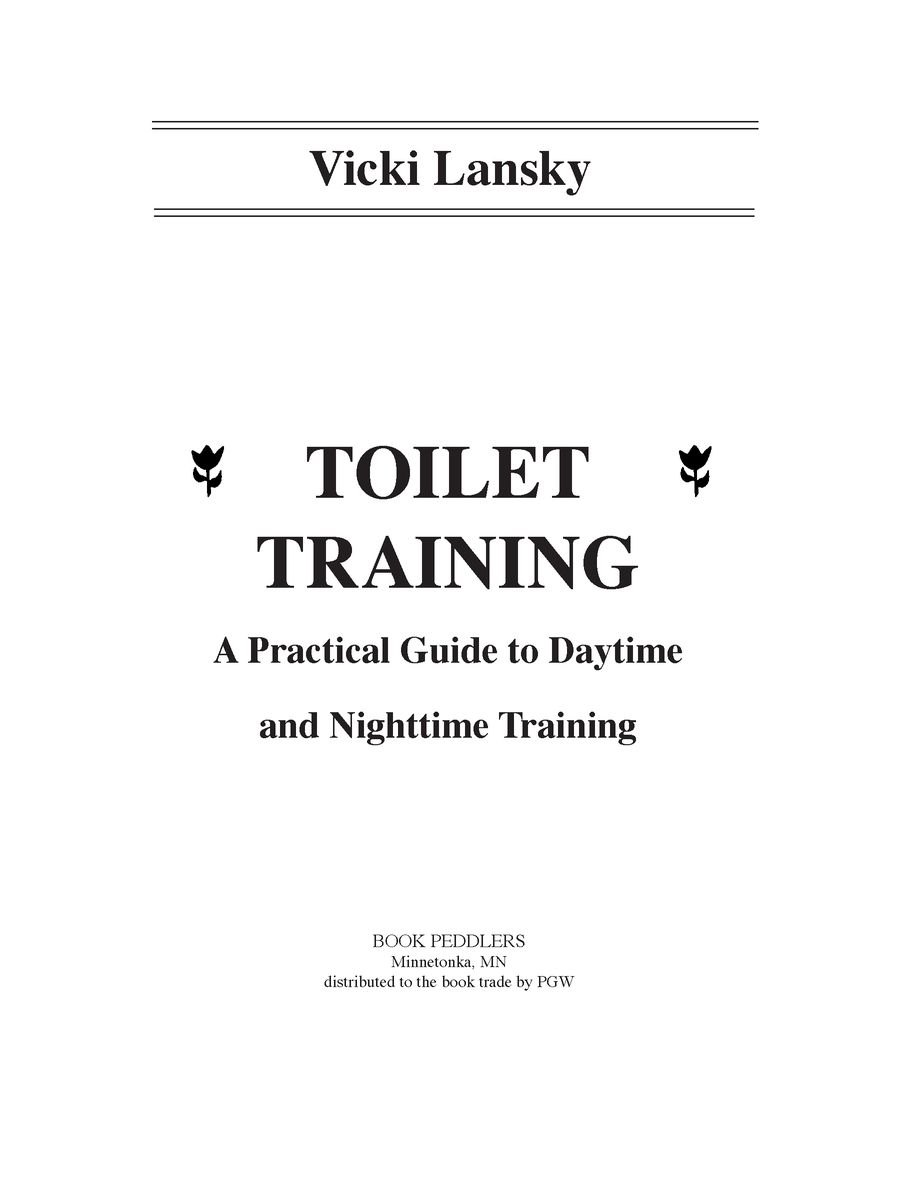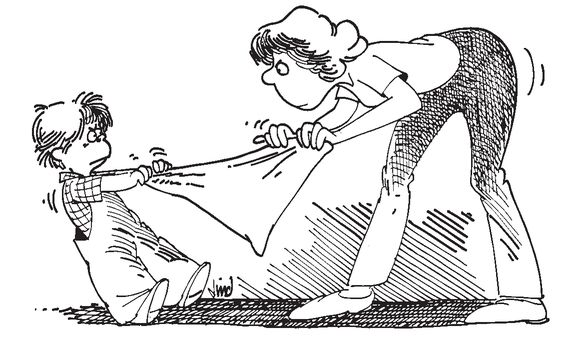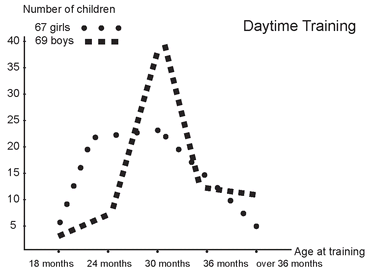Table of Contents
Thanks to Editors:
Toni Burbank, Maria Mack, Kathryn Ring, Sandra Whelan, Jeane-Marie Sohlden,
Kate Moore, Carol Lowry, Abby Herstein and Dian Schwarze
Consultants:
Karen Olness, M.D., Minneapolis Childrens Health Center
Judy Owens-Stively, M.D., Minneapolis Childrens Health Center
Peggy Osterholm, R.N., P.N.P., Wayzata Childrens Clinic
Rebecca Kajander, R.N., P.N.P., Wayzata Childrens Clinic
Burton White, Ph.D., Center for Parent Education, Newton, MA
Joan Reivich, Booth Maternity Center, Philadelphia, PA
Meg Zweiback, R.N., P.N.P, M.P.H., Oakland, CA
Daniel P. Kohen, M.D., Minneapolis Childrens Health Center
Special thanks to the parents who shared their words and feelings. Their quotes are reprinted with permission from Vicki Lanskys Practical Parenting Newsletter and respondents to Vicki Lanskys Practical Parenting column in Sesame Street Magazine Parents Guide.
Illustrator: Jack Lindstorm
Introduction
Why Is Toilet Training Such a Big Deal?
A number of things can contribute to a parents strong need to get a child toilet trained, right now. Some are pressures from your peers, fear that youre failing as a parent by tolerating a child in diapers, the enrollment of your child in preschool, and, not least, the strains and stresses of whats known as diaper drag.
First, assume that any neighbor or relative who claims victory in toilet training her child before yours is lying (well, maybe exaggerating), fantasizing, or redefining the term. I never considered my children really trained until they could get in and out of the bathroom, get their clothes off and back on, clean their bottoms properly, and wash their handsall without any help from me. But for now, well work with that more limited but still important definition that simply has the child saying, Get me to the potty in time.
Second, plan not to take it personally. Your childs readiness for toilet training is no indication of his or her IQ, your level of parenting ability, or your parents attempts to raise you properly. (Despite what your mother-in-law might imply about your 3-year-old still being in diapers, doesnt mean she did a better job than youre doing.)
Third, be assured that it will happen. When your child is truly ready, physically and emotionally, toilet training will happen rapidly. And be assured that while its going on, toilet training is very, very important, but when its accomplished, youll wonder why it seemed like such a big concern!
Fourth, remember that you are not alone. When your child regresses for the third time, meditate on the fact that, simultaneously, several million other mothers and fathers are earning their toilet-training merit badges, too.
One controversy on this subject is the language used to describe this process. Its called toilet learning, potty training, toilet teaching, and toileting. Yes, learning may be more accurate than training, at least according to todays wisdom, but Ive never had anyone ask me if my child was toilet learned. So please bear with my preference for toilet training, and dont search for deeper meanings.
Remember that there are three things you
can never make your child do
eat, sleep, or go to the bathroom.
Chapter 1
When Is My Child Ready to Be Toilet Trained?
The days of hand-hemmed, hand-washed, line-dried diapers are gonethank goodness. So that should signal an era of more relaxed, less anxious parents, right?
Wrong!
The prospect of toilet training today evokes as much concern as it ever did. The pressures of friends and relativeseven doctorsas well as practical considerations have pushed many parents into premature toilet-training attempts that eventually ended in failure and frustration.
It is true that current wisdom has made many parents less intense about having a child trained before the age of two. Early training is no longer the norm, but once a parent decides that the time has come, relaxation seems to go out the window.
The simple fact is that your child must be physically and emotionally mature enough to understand and to control what is happening in the process. If you begin to toilet train a child before this point, the odds are that it simply wont work. A child who is trained before age two usually has a toilet trained parentone who is trained to catch the child!
Physical maturation first becomes possible with voluntary control over the sphincter muscleswhich means being able to open and close very specific internal muscles. While this is possible by about one and a half years, this voluntary control only truly begins when a child can distinguish the sensations that precede a bowel movement or urination. This, in turn, depends on a certain amount of maturity of the central nervous system, over which no one has control.
You dont toilet train childrenyou wait for their bodies to mature (a fact God has already worked out). I made a game of it, with a timer set for 15 minutes after drinking a liquid. My son loved it.
Linda Hurstell, Vicksburg, MS
Emotional readiness is also crucial. A childs sense of self starts to emerge around the age of two. For the first time, the child realizes that he or she can affect the world and his or her own life. Unfortunately, one of the first manifestations of this new found power occurs during the terrible twos stage when a child seems interested only in affecting his or her world negatively! Its not all bad, though.
One of the positive results of this emerging assertiveness is a desire to grow up. And one of the best examples of grown-up behavior a child can relate to is being toilet trained. Once your child arrives at this point, he or she is more likely to cooperate with your toilet training efforts because he or she wants to. Body mastery is more self-rewarding than a desire to please.
The average child cannot be successfully toilet trained before the age of about 28 months. While girls are often trained by two, boys may not be trained before three or later.
A report in the Journal of Ambulatory Pediatrics (2001) showed that the average age of completing toilet training35 months for girls and 39 months for boysare the oldest ages yet reported and in line with the trend of the increasing age for toilet training.
These results of a Practical Parenting Newsletter survey (1984) are similar to a 2001 study by the Medical College of Wisconsin conducted by Timothy R. Schumm, M.D.
But of course the exception to prove this rule will inevitably be your neighbors child, a child in your childs play group, or your sister-in-laws child.


